
BY ARI PHILLIPS MARCH 20, 2014 AT 5:15 PM UPDATED: APRIL 8, 2014 AT 3:50 PM


Americans for Prosperity Foundation Chairman David Koch speaks in Orlando, Florida, in August, 2013.
CREDIT: AP PHOTO/PHELAN M. EBENHACK
The Koch Brothers are known for many things — their vast financial empire, their conservative political ideology, their active political involvement, their support of the Keystone XL pipeline — but their Alberta, Canada land ownership has not been as widely discussed. A Washington Post feature has brought this subject back to attention as the Keystone XL debate heats up and discussion over the relationship between the Koch Brothers and their Republican allies takes on even greater significance in an important election year.
According to the Washington Post, which uses a report from the activist group the International Forum on Globalization as a foundation, a Koch Industries subsidiary holds leases on 1.1 million acres in the northern Alberta oil sands, an area nearly the size of Delaware. The Post confirmed the group’s findings with Alberta Energy, the provincial government’s ministry of energy.
“What is Koch Industries doing there?,” asks the Washington Post. “The company wouldn’t comment on its holdings or strategy, but it appears to be a long-term investment that could produce tens of thousands of barrels of the region’s thick brand of crude oil in the next three years and perhaps hundreds of thousands of barrels a few years after that.”
In 2012, InsideClimate News reported on the Koch family’s long-term investments in Canada’s heavy oil industry, calling it an essential part of the company’s massive growth since 1959. In a wide-ranging analysis, InsideClimate News found that Koch Industries has been involved with almost every aspect of the tar sands industry, from mining bitumen to transportation, exportation, distribution and, of course, refining the petrochemicals — a large part of their empire.
The report found that Koch Industries is “one of Canada’s largest crude oil purchasers, shippers, and exporters, with more than 130 crude oil customers,” and is also responsible for about 25 percent of oil sands crude imports into the U.S., for use at its refineries.
In their recent report The Billionaires’ Carbon Bomb about the Koch Brothers and the Keystone XL pipeline, the International Forum on Globalization (IFG) contends that Koch Exploration Canada, the Koch Industries subsidiary that buys and sells land for energy development, could profit by up to $100 billion with the construction of the Keystone XL pipeline. While this number is up for debate, it is clearly not a losing investment. And at the very least the construction of the Keystone XL pipeline would lower transportation costs of getting the oil to refineries, increasing the production margins of those refineries, whether Koch-owned or not.
“The biggest way Koch could benefit from Keystone is by the pipeline’s acting as the ‘keystone’ of oil industry strategy to increase the ‘takeaway’ capacity for producers of Canadian crude, whereby getting more oil to more lucrative markets, and ending the deep discounts on Canadian crude currently glutting markets,” IFG’s Victor Menotti told the Washington Post.
In Alberta, like in many places in the U.S., owning the land and owning the mineral rights beneath the surface are different things. According to the Alberta Department of Energy, 81 percent of the surface mineral rights in the province are owned by the provincial Crown, with the remaining 19 percent owned by National Parks, First Nations, or individuals or corporations that acquired the land in the 1800s before the modern rights went into effect.
Koch Industries has held the line that they have no financial stake in the Keystone XL Pipeline and “are not party to its design or construction,” or “a proposed shipper or customer of oil delivered by this pipeline.”
Most people in the path of oil and gas development find themselves helpless in the face of the industry’s deep pockets and political affiliations. Landowners and farmers are left to deal with the environmental and health impacts of nearby fracking and drilling, often polluting or drying up their water sources. It would seem that the Koch brothers would be happy to sell their land away for a little profit — and with little risk of physical or psychological harm. They doubtlessly have land to spare. And until the true impacts come to their own backyard — as they recently did for ExxonMobil CEO Rex Tillerson outside of Dallas — that isn’t likely to change.
UPDATE
The Washington Post revisited this story on April 8 to state that further reporting revealed that Koch Industries on a net acreage basis is the largest American and foreign holder of leases in Canada’s oil sands but it might narrowly trail two Canadian companies overall.
The Koch Brothers-Keystone XL Filthy Oil Connection;
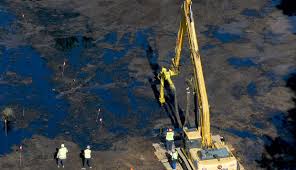
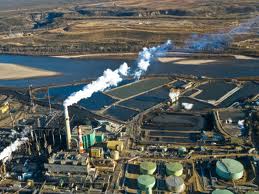
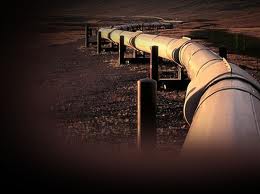
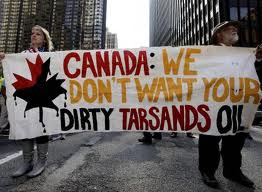
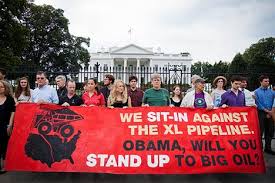
Furthermore, "Currently, most Canadian tar sands exports are mainly limited to the U.S. Midwest market by a lack of transportation infrastructure." This fact (the lack of "infrastructure" or transportation facilities to move the oil to the international market) keeps down not only the price the Kochs can get for their oil (since it can't currently be sold on the international market); it also greatly lowers the sheer volume of it that they can sell (at any price), because the local Midwest oil market is small. Keystone XL would thus also enormously increase the annual sales-volume of this currently deeply landlocked oil.
Moreover, if this filthy oil isn't sold out fast, it won't ever be sold at all; and here is why, as explained by no less than the Oil & Gas Sector Analyst at the world's largest bank (in terms of assets):
He says, "Between 60 and 80% of current fossil fuel reserves listed on global markets cannot be burned if we are to limit the rise in global temperature to 2 degrees [Celsius, or 4.5 degrees Fahrenheit]," and that's the temperature-rise 97% of climatologists endorse as being the cut-off point that mustn't be exceeded if the climate is to avoid going haywire with soaring heat and destroying the planet's biosphere as humans have always known it.
He was accepting the climatological consensus, and he thus issued a study, "Oil & Carbon Revisited: Value at Risk from 'Unburnable' Reserves." His team calculated that for just oil-producing companies alone, "the value at risk from unburnable reserves would be equivalent to 40-60% of the market capitalisation."
This percentage would be even worse (much higher) for the Alberta tar-sands oil than for normal oil, because throughout its entire cycle, from the ground through to burning, the tar-sands oil generates far more carbon dioxide than does the cycle for regular oil.
Consequently, Keystone XL is do-or-die for the Kochs, since they own half of this ultra-filthy oil. Also consequently, they need to buy the U.S. Government to adopt laissez faire policies that will prevent environmental and other types of regulation, etc., which would threaten their ability to sell this oil fast and completely (before enforcement kicks in). So: "The cumulative cost to Koch Industries and Charles and David Koch for ... political and lobbying influence, nonprofit public policy underwriting and educational institutional support was $134 million over a recent five-year period [2007-2011]." This is a pittance in comparison to the roughly $100 billion they stand to gain from selling their tar-sands oil -- which can happen only if the U.S. Government approves Keystone XL and succeeds in browbeating Europe into relaxing their anti-global-warming regulations.
This is just the Kochs' business-plan to become the world's two wealthiest men. It's a status thing, actually -- rather normal for conservative aristocrats, but deadly with the Kochs.
If Obama approves Keystone XL, and forces Europe to relax their anti-global-warming rules, then the likely outcome will be that Charles and David Koch will achieve their dream of being the world's wealthiest men, and also that 500 million metric tons of carbon will be added to our planet's atmosphere. (Note: that link also explains how Obama's State Department rigged their environmental impact statements on Keystone XL, for anyone who wants to know.) This will be a virtually permanent atmospheric carbon-increase, which will work each and every year for centuries, to increase our planet's heat. Once it's done, it won't be able to be undone. This will become a different planet.
In short: what the Keystone Pipeline would do is enable the tar-sands oil, which produces the highest CO2 throughout its entire cycle (from the ground through to its burning), to be far more cost-competitive than it now is versus regular oil. Right now, it costs about 50% more to produce-and-get-to-market than does normal oil (see page 16 there), because it's so landlocked and so dirty (thus, also, more expensive to refine). The Keystone Pipeline is all about making that oil more cost-competitive, even though that will get the world to climate-catastrophe much faster than if Keystone isn't built. They don't want their two-million-plus acres of tar-sands oil to become worthless -- which would happen if the anti-global-warming regulations start being enforced. So, they need Keystone XL -- and soon.
With all things considered, why do you suppose that we are spending so much time, effort and money on reaching Mars? ... Just asking! Don
